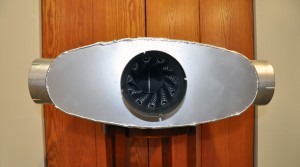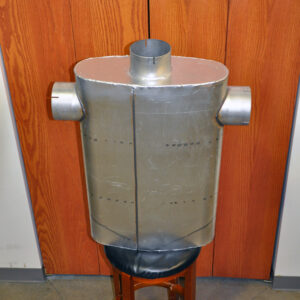 Freightliner Coronados with DD5 engines have very restrictive mufflers under their cab. To combat this problem, we have designed a special muffler that has the exhaust coming in the front and out the front sides of the muffler to the dual stacks. If you stood this muffler on end, it would look like a human body with the head, arms and legs cut off, so we call this the “Little Man” muffler (see photo). This muffler was designed by our vice president Pete Sharp, and we are seeing 1/2 to 3/4 mpg improvements just by changing to this muffler.
Freightliner Coronados with DD5 engines have very restrictive mufflers under their cab. To combat this problem, we have designed a special muffler that has the exhaust coming in the front and out the front sides of the muffler to the dual stacks. If you stood this muffler on end, it would look like a human body with the head, arms and legs cut off, so we call this the “Little Man” muffler (see photo). This muffler was designed by our vice president Pete Sharp, and we are seeing 1/2 to 3/4 mpg improvements just by changing to this muffler.
Ed Hess of Idaho, one of the participants at our Owner Operator Snowmobile Conference we held a few months ago in Wyoming, just installed one of these mufflers on his Coronado and he loves the performance and fuel mileage gain – which is right in there at about 3/4 mpg. When we begin working on a truck to improve its fuel mileage and performance, we always start with the muffler. Stock mufflers are ultra quiet, but they are extremely high on back pressure (restrictive), which robs the engine of fuel mileage and produces extra soot in the engine because it can’t escape the muffler. Our “Little Man” muffler will also keep your oil cleaner by reducing the back pressure in the exhaust system. An increase in the engine’s performance is also a likely result when changing to this muffler.
Big Cam Cummins engines may be considered “old” by today’s standards, but these classic engines are what many of us learned on, so we still keep most of the parts for them in stock. If you are in need of Big Cam Cummins parts, give us a call – we just might have the part you are looking for. Because of the computer age, if a part doesn’t sell every month, most truck dealers, engine dealers, and parts stores will not keep that part in their inventory. We here at Pittsburgh Power are a little old fashioned – maybe even “old school” – so we like to have what others don’t. Give us a call or stop by our shop today.
 Lucas Oil Products is at it again – developing new products that do exactly what they say they will do. I just purchased their Octane Booster which is NOT street legal, so it must be good! According to Forrest Lucas himself, this product will raise 93 octane fuels to 96.3 octane. I have a 2009 Harley with the 110 cubic-inch engine and it pings when pulling hills, so I tried the Lucas Octane Booster and the ping was gone! Forrest also told me he now has “Hot Rod Oil” (which I did not even know existed). I asked him what makes oil “Hot Rod” friendly and he said, “Zinc was removed out of today’s oil because of the catalytic converters, and it was the zinc that lubricated the metal-to-metal surfaces in the engine.” Interestingly, I remember when the zinc was removed – there were a lot more than usual camshaft failures after that. So, I called two old friends of mine from my racing days, Chuck Dinunzio of B&R Speed in Verona, PA and Rich Mercaldi, who is a NASCAR engine builder, and they both agreed that when a flat tappet cam is installed in a gasoline engine, it is coated with zinc phosphate additive to aid in the breaking in of the cam and lifter. If you have an older gasoline engine with a flat tappet camshaft, you need to use oil with zinc, such as Lucas Hot Rod Oil.
Lucas Oil Products is at it again – developing new products that do exactly what they say they will do. I just purchased their Octane Booster which is NOT street legal, so it must be good! According to Forrest Lucas himself, this product will raise 93 octane fuels to 96.3 octane. I have a 2009 Harley with the 110 cubic-inch engine and it pings when pulling hills, so I tried the Lucas Octane Booster and the ping was gone! Forrest also told me he now has “Hot Rod Oil” (which I did not even know existed). I asked him what makes oil “Hot Rod” friendly and he said, “Zinc was removed out of today’s oil because of the catalytic converters, and it was the zinc that lubricated the metal-to-metal surfaces in the engine.” Interestingly, I remember when the zinc was removed – there were a lot more than usual camshaft failures after that. So, I called two old friends of mine from my racing days, Chuck Dinunzio of B&R Speed in Verona, PA and Rich Mercaldi, who is a NASCAR engine builder, and they both agreed that when a flat tappet cam is installed in a gasoline engine, it is coated with zinc phosphate additive to aid in the breaking in of the cam and lifter. If you have an older gasoline engine with a flat tappet camshaft, you need to use oil with zinc, such as Lucas Hot Rod Oil.
At our shop in Saxonburg, PA we are currently scheduling large jobs for the month of January, so we are booked for the next six months. However, Pete Sharp, our vice-president, calls everyone on Wednesday the week before to remind them of the work they are scheduled to have done. We often get one or two cancellations a week because of trucker’s varying schedules, so if you can’t wait six months to get your truck worked on, call us on Thursday or Friday and ask if we have had any cancellations for the following week. Chances are, we will be able to get you into our shop. We are currently in the process of adding 10,000 square feet of garage and engineering space to our existing building which will be ready in late August. By doubling our shop space, we hope to be able to shorten the waiting list.
I have recently noticed that some owner operators just push the throttle to the floor when starting out and after every shift – some even up-shift at 1300 and 1400 RPM, grabbing a full gear and then just mashing the throttle at 900 RPM, expecting the ECM to take care of their reckless “pedal mashing” habits. These bad habits are usually found with people who have never driven a performance mechanical diesel engine. If you have us re-program your ECM to make it more powerful and responsive, you will need to resist that pedal-mashing temptation even more, because you will now have even more power at your command. So, just ease into the throttle – don’t mash on it! When driving, always remember the old theory: you should drive like you have an egg between your foot and the throttle. Despite what some of you might think, power and performance do not come from a heavy foot. For comments and/or questions, call (724) 360-4080 or e-mail me directly at bruce@pittsburghpower.com.
